It is widely argued that sporting contests and their mediation have, historically, been central to the development of notions of “national” culture and identity in modern societies, and that this development is often inflected by notions of race and gender. We took an example of this argument to highlight how we felt it applied to the unique rivalries that exist between Scotland’s Glasgow Celtic and Glasgow Rangers and Spain’s F C Barcelona and Real Madrid and what the implications are of the approach for our understanding of sport and power relations in society?
We apply the above argument to the history and culture of the football contests played out between the Scottish rivals Celtic and Rangers and the Spanish rivals Barcelona and Real Madrid.
The article below was written some 12 years ago when the current (2012) financial situation with Glasgow Rangers would have seemed ridiculous… my how times change! But what this article highlights is still relevant to the core cultural values of the fans of these clubs …although owing to the now corporate domination of football clubs and ‘corporate’ ownership / sponsorship, the historical culture is now sadly in danger of becoming a mere dressing instead of a main ingredient of the recipe of these clubs!
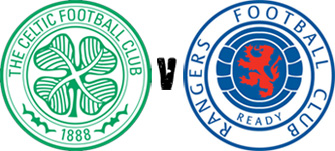
Celtic v Rangers
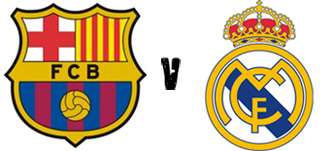
F.C. Barcelona v Real Madrid
The main issues that are raised in the question of sport, mediation and popular culture that applies to these clubs and games between them are: –
- Notions of national culture and identity
- Notions of race
- The dominant power that these clubs have in their respective leagues, both on and off the field
- The implications of each clubs own public relations profile on themselves and on each other, and how this affects our understanding of them
Two texts were chosen to look at in relation to the main issues raised in the question. Gary chose ‘Scottish Myopia and Global Prejudices’ by Gerry P. T. Finn. This is from Gerry P.T. Finn & Richard Giulianotti, (ed’s), (2000), Football Culture: Local Conflicts, Global Visions (Sport in the Global Society). Frank Cass Publishing, London.
Steve’s chose ‘Storming the Castile: Footballing Nations in Spain’, from Vic Duke & Liz Crowley, (1996), Football, Nationality and the State Longman, Harlow.
A traditional description of the cultural identities of these clubs could be listed as
Celtic – Catholic, Scots/Irish
Rangers – Protestant, Scots/British.
Barcelona – Catalan, republican (seek Independence from Spain).
Real Madrid – Spanish (Royal Madrid – capital city club) home of Spanish nationalism and known as Franco’s team during the fascist dictators reign.
The above description of the social culture surrounding the Glasgow ‘Old Firm’ is a very generalized description. Both have a lot more ‘baggage’ with their identities in this day and age.
There are the political leanings that both sets of supporters are generally identified with, that straddle British and Irish politics. The religion aspect and its prejudices is one that the social history of Scotland hides, but it is well documented in harbouring.
The difference being that these prejudices in Scotland have not had the world stage exposure that they have had in Ireland over the years, focusing on Northern Ireland and ‘The Troubles’ especially. Scotland’s prejudices have ‘luckily’ managed not to spill over into civil unrest.
Catalonia – North Eastern region of Spain: It is a region that has consistently held out for its own cultural identity and independence. The Catalan region has its own language and has adopted a more openly European attitude in its social culture. The Catalan people see themselves as more hard working and industrious than the other Spanish regions. It has strove for its independence from Spain in the past.
It sided with the Republican movement during the Spanish Civil War from 1936 to 1939. The Madrid based nationalist forces under General Franco were their enemies.
After defeat by the nationalist forces Franco banned the speaking of the Catalan language in public during his time in power. The only place the Catalan people felt safe in speaking their own language was at Barcelona’s Nou Camp stadium.
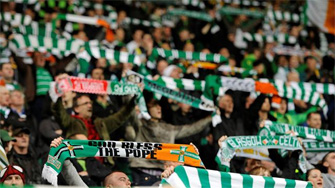
Celtic Fans
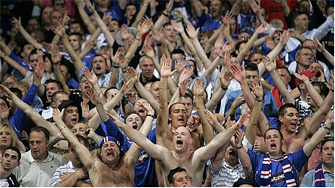
Rangers Fans
Celtic v Rangers: Glasgow Rangers have received throughout their history various degrees of bad press for the actions of both supporters and club officials and gained notoriety for actions of bigotry. A strong historical stance against the signing of Catholic footballers was given a make over in recent years with the signing of European players, some of Catholic denomination.
But the ‘criticism’ was not deflected because of Rangers’ poor record of signing Scottish/Irish Roman Catholics. Other than the media hype of the Mo Johnson signing in 1989, (which could be suggested was a massive PR campaign to spotlight Rangers to the detriment of Celtic, more so than the Rangers hierarchy really wanting the services of Mo Johnson), the signing of an Irish Catholic has not happened yet to my knowledge, but at the same time I would be surprised if there would be many Irish Catholics who list Rangers amongst one of their favourite clubs…and for that matter Irish Protestants who would list Celtic!
Gerry Finn in the article ‘Scottish Myopia and Global Prejudices’ takes B. Murray, author of Glasgow Giants: 100 Years of the Old Firm. (1988). to task for suggesting that “…sectarianism was introduced by the Catholic Irish – Scots. In fact the real origin of sectarianism in Scottish football lay in the very formation of Celtic Football Club and their unprecedented success.”p.87 (p. 56).
Finn produces the “… evidence of strong political influence on Rangers” and of them being “…identified with Ulster Unionism and the protestant cause before the establishment of Celtic…”(p. 58). He also states that some of the reports and actions associated with ‘sectarianism’ in Scotland or hidden behind the term sectarianism are blatant acts of Irish racism. He uses evidence also gained from the CRE – Commission for Racial Equality “It confirms that their (Irish peoples) experiences often merit being described as racist.” (p. 57). He points out that because there is no skin colour difference these ‘experiences’ are not noted as racist but are passed off as sectarian.
Celtic has never had a discrimination policy in their player or manager appointments. In fact some of the Celtic greats have been Protestant and Rangers fans as youngsters. For instance – Jock Stein, Kenny Dalglish and Danny McGrain.
The singing of Irish Rebel songs (although these songs have been sung since the formation of the club) has been to the detriment of Celtic’s name in recent years. Campaigns have been launched to stop the singing of ‘sectarian’ songs at the games by the clubs themselves, via public appeals, politicians and the media. Rangers have also come in for large criticism for their ‘loyalist/anti-Catholic/Irish’ repertoire of terrace chants and songs.
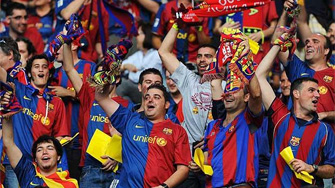
Barcelona Fans
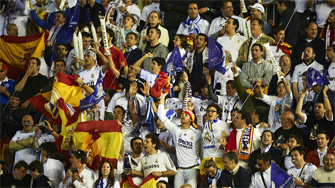
Real Madrid Fans
FC Barcelona v Real Madrid: After Franco’s victory in the Spanish Civil War, in an effort to wipe out any traces of regionalism or separatism, Franco ordered the burning of the Catalan flag. He also ordered the renaming of all Spanish football clubs into the Spanish language.
For example FC Barcelona became Club de Futbol de Barcelona. This helped fuel the rivalry between Barcelona and Real Madrid. Due to Franco’s associations with Real Madrid and Madrid being the center of the Franco regime, the football club became the symbol of nationalist Spain and in many respects took the role of the national team.
Celtic v Rangers: The nickname given to Celtic and Rangers in Scotland is ‘The Old Firm.’ This was given to them by the other clubs in Scotland due to their dominance of Scottish football not only on the field of play but also in the boardroom of the Scottish Football Association.
The financial power of the two could not be matched by any other club so they wielded some influence on matters concerning Scottish football. One historical clash between the two, off the field of play, came about during the 1960s when the Scottish FA approached clubs throughout the country for donations towards the revamping of Hampden Park – the national stadium. Celtic and Rangers were, because of their stronger financial position and to some clubs way of thinking, because of their frequent Cup Final appearances there, expected to put a lot more in the pot than the other clubs.
They duly obliged but what became clear later was that Celtic had put more in than Rangers but the only redevelopment that took place was on the end of the ground traditionally reserved for Rangers fans. It got re-roofed and Celtic’s end was left untouched. It is suggested that Celtic recouped the money in gate receipts from later appearances there.
A threat to the Scottish FA (in 2000) is if the two clubs decide to form the Atlantic League with clubs from Holland, Portugal and Belgium, so as to increase their standing on the world football stage. If Celtic and Rangers decide to do their football business elsewhere it would leave Scottish football floundering financially and without any big name clubs (the irony of this owing to the current financial predicament of Rangers in 2012 is poignant).
FC Barcelona v Real Madrid: In Spain one of the most famous off the field clashes was in 1953 with the transfer of Alfredo di Stefano from River Plate in Argentina. Barcelona first thought that they had signed di Stefano. However the Spanish FA stopped the transfer because he was on-loan at Millonarios de Bogotá in Columbia. In the meantime Real Madrid had also arranged the transfer with Millonarios.
The Spanish FA stepped in as arbitrators and instructed that di Stefano would play alternate seasons with Real Madrid first then Barcelona. Barcelona took this as an insult and withdrew from the transfer negotiations. Alfredo di Stefano’s subsequent transfer to Real Madrid bought about the clubs greatest achievement to-date, winning five European Cups in a row, 1956 – 1960, the 1960 final being played at Hampden Park of all places!
Their eventual downfall from this dominance of European football was at the hands of Barcelona in 1961 in an early round of the competition. Barcelona was accused of knocking ‘Spain’ out of the European cup by the Spanish press.
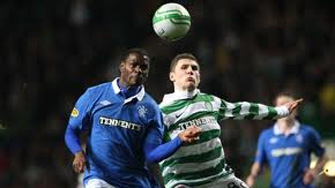
Celtic v Rangers
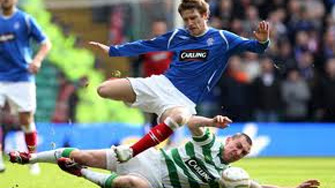
Celtic v Rangers
Celtic v Rangers: I would suggest that in the case of Celtic and Rangers that the one could not have become as powerful without the opposition of the other. I would also suggest that there is a certain amount of co-operation with one another over the public perception of the rivalry between the two. In a commodities age such as now these clubs have a massive fan base in Scotland and Ireland as well as throughout the UK mainland. They also have world wide sales through outlets in Europe, America and Australia for instance.
The Irish identity of the Celtic supporter I would also argue has been much stronger in the last 25 years and more visible than at any time since the founding of the club. Due to the raised profile of the Republic of Ireland’s team and the past accusations of biased against Celtic players playing for Scotland (and Celtic supporters watching Scotland), this I would argue gave the younger generation of Celtic fans another option with their support of a national team.
An older generation had no real football alternative internationally, but also Scotland were doing very well during the 1970s for example and were high profile, so their appeal to all denominations, both in religion and football would have been increased.
For the Rangers fan a new dilemma began creeping into their national affiliations with the Scottish team… Scottish Nationalism! This is frowned upon with a lot of the Rangers supporters. Rule Britannia is their battle cry and God Save the Queen! I would suggest with this separatist attitude defining the national background of Scotland this could lead to some of the Rangers faithful seeking a ‘national identity’ in the following of Northern Ireland to the cry of ‘We Are A People’…there have been some stories of Rangers fans following England!
A memorable unfurling of a large Union Jack amongst the England supporters at Hampden during the 1st leg of a Euro 2000 qualifier in 1999 with Rangers emblazoned on it bought loud jeers from the Scotland fans. There are also reports of Rangers fans booing the Scottish National Anthem ‘Flower of Scotland’ and chanting it down and singing ‘God Save The Queen’ at other games. Also, there has been a significant increase in the setting up of Ulster/Scots Heritage Societies and calls for their own culture and language to be recognized.
The surface is hardly scratched in the media’s delivery to us of the massive rivalry that these two football clubs operate in. It’s more than the game of football… but thankfully some of it can be decided for a short time by a game of football!
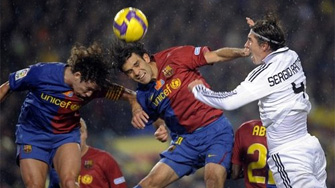
F.C. Barcelona v Real Madrid
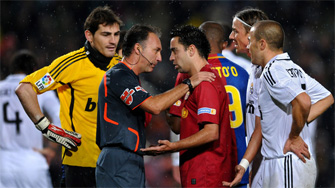
F.C. Barcelona v Real Madrid
FC Barcelona v Real Madrid: Barcelona widely used the media for its cause during the 1980s via presentations of managers and players addressing the fans at the Nou Camp in the Catalan language – e.g. ‘El Tel’ – Terry Venables and English striker Gary Lineker.
FC Barcelona prides itself as representing Catalonia not Spain. It markets itself as ‘Mes Que Un Club’ this is Catalan for ‘More Than A Club’. However not only does it feel great pride in representing the city and region it also presents the image of having a strong European and international outlook. It likes to play upon the sense of unfairness it receives from the Spanish FA.
Real Madrid’s success in the late 50s and early 60s was clearly used by the Franco regime to help promote Spain at a time when it was politically ostracized by the rest of Europe. It became known as the team of the regime. In fact the then Spanish Defence Minister called Real Madrid ‘one of Spain’s best ambassadors’.
However since Franco’s death in 1975 there have been changes in the political structure of Spain. This has allowed the regions greater freedom of expression. Spain today now encourages the difference between regions, Catalonia has welcomed this change. Football and FC Barcelona were considered to be the one form of its expression of freedom, but there are others now.
To collate these summaries on these four great footballing institutions together we would like to say that the age old saying of ‘never mix sport, politics and religion’ has been treated with total contempt by these four footballing giants…and long may they play the game. Sport, Media and Popular Culture… play on.
Reference and Bibliography
‘Scottish Myopia and Global Prejudices’ by Gerry P. T. Finn. This is from Gerry P.T. Finn & Richard Giulianotti, (ed’s), (2000), Football Culture: Local Conflicts, Global Visions (Sport in the Global Society) Frank Cass Publishing, London.
‘Storming the Castile: Footballing Nations in Spain’, from Vic Duke & Liz Crowley, (1996), Football, Nationality and the State Longman, Harlow.
Copyright
Gary O’Dea and Steve Whitty 2000 – – not to be copied or used without the permission of Copyright holder.



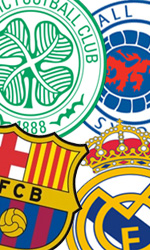
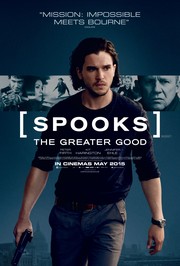


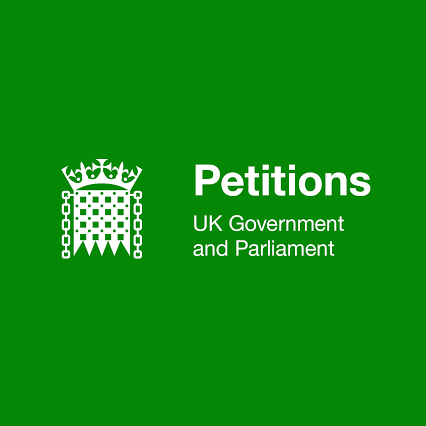
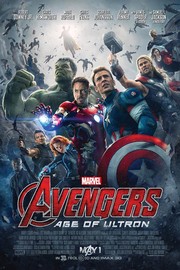












Categories: Lifestyle | Author: Gary O'Dea | Leave a comment